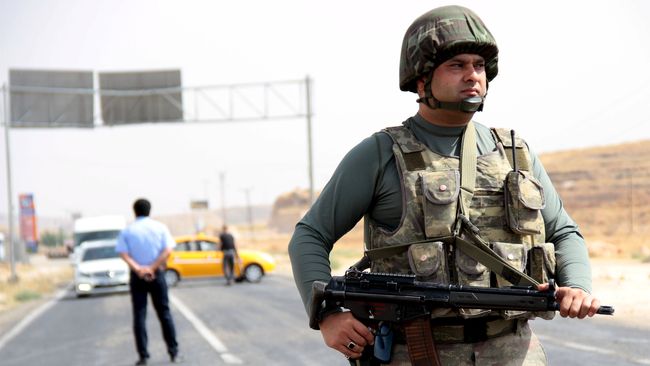Trying to close Kurdish issue
Expert explains why Turkish troops step up combat operations against militants in northern Iraq
There has been a surge in violence between the Turkish army and the PKK (Kurdistan Workers’ Party) after a ceasefire collapsed in July, with skirmishes taking place on an almost daily basis. On Monday, 16 Turkish servicemen died during a Kurdish bomb attack on a Turkish convoy. In retaliation Turkey carried out several air strikes on PKK targets in northern Iraq and Turkish special forces crossed into Iraq, in hot pursuit of PKK militants involved in recent acts of terrorism. Turkish media reports heavy PKK losses (35-40 men killed). Prime Minister Ahmed Davutoglu told a news conference on Monday: “You cannot discourage us from our war on terror. Those mountains will be cleared of these terrorists. Whatever it takes, they will be cleared.”
On Tuesday, a crowd of nationalists attacked the headquarters of Turkey’s pro-Kurdish HDP party in Ankara (this party won seats in parliament for the first time, mostly owing to ethnic Kurds’ support, although it denies any involvement with the Kurdish militants).
COMMENTARY
Ihor SEMYVOLOS, executive director, Middle East Study Center, Kyiv:
“Turkish troops have crossed into Iraq on more than one occasion. In this case the key objective is reducing the Kurdish threat to a minimum while combating the Kurdistan Workers’ Party. With this in mind, Ankara will try to get maximum support from the United States. Turks have set this political course and they will keep following it.”
How would you explain that attack on the pro-Kurdish party’s headquarters in Ankara?
“On the one hand, bombs are exploding at police precincts, obviously involving Kurdish terrorists. On the other hand, the Turkish government is responding to these acts of terrorism. Sad but true, the situation is getting from bad to worse.”
Who do you think will benefit from the worsening of the situation, the Kurdish terrorists or the Turkish government?
“There are opportunities for both, what with the war in Syria, the ISIS issue, with each side trying to take advantage of the situation. Kurds want to be heard across the world, they are claiming their rights. Russia wanted the Kurds to become a separate issue in this war during the recent talks with the Saudis. Kurds, of course, want to enact this scenario; they want to make their stand in the matter clear to the international community. This can be done either by terminating the ceasefire or by stepping up hostilities. Turkey wants to close the Kurdish issue, at least for a long while, but the Kurds want to keep it open and at a boiling point. All the others want Turkey to take a more active part in the war against the caliphate.”
How can this situation affect the elections in Turkey? Who will benefit more from it? The ruling party?
“Most likely so. The Justice and Development Party (AKP) has long taken a moderate Islamic stand, but now the party line can be best described as nationalistic. AKP leadership must've realized that they could kiss goodbye to the Kurdish electorate and that the best they could do was win support from the Turkish nationalists, using public wartime frustration. At the same time, it would be wrong to assume that AKP is actually getting nationalistic. They’re simply trying to use nationalist sentiments to win the election race. Whereas previously the Kurds voted for Erdogan and largely secured his dramatic victory, now his party must have concluded that there is no sense in counting on the Kurdish electorate.”
What should Ukraine expect from the outcome of the presidential elections in Turkey on November 1?
“We mostly expect Turkey to adhere to the principles of relationships that exist between our countries. I don’t mean that Ankara should join the campaign of sanctions against Russia. This is highly unlikely. The important thing is for Turkey not to change its stand in refusing to recognize the annexation of Crimea.”
Section
Topic of the Day





